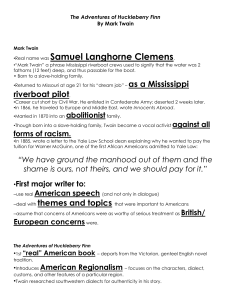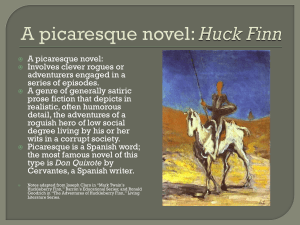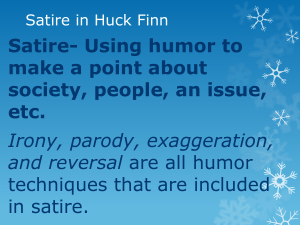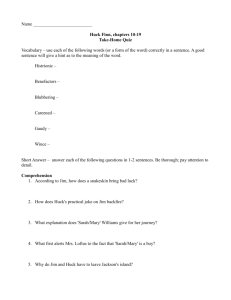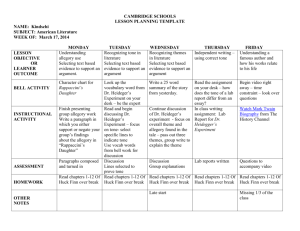Huck Finn Satire Unit Plan
advertisement
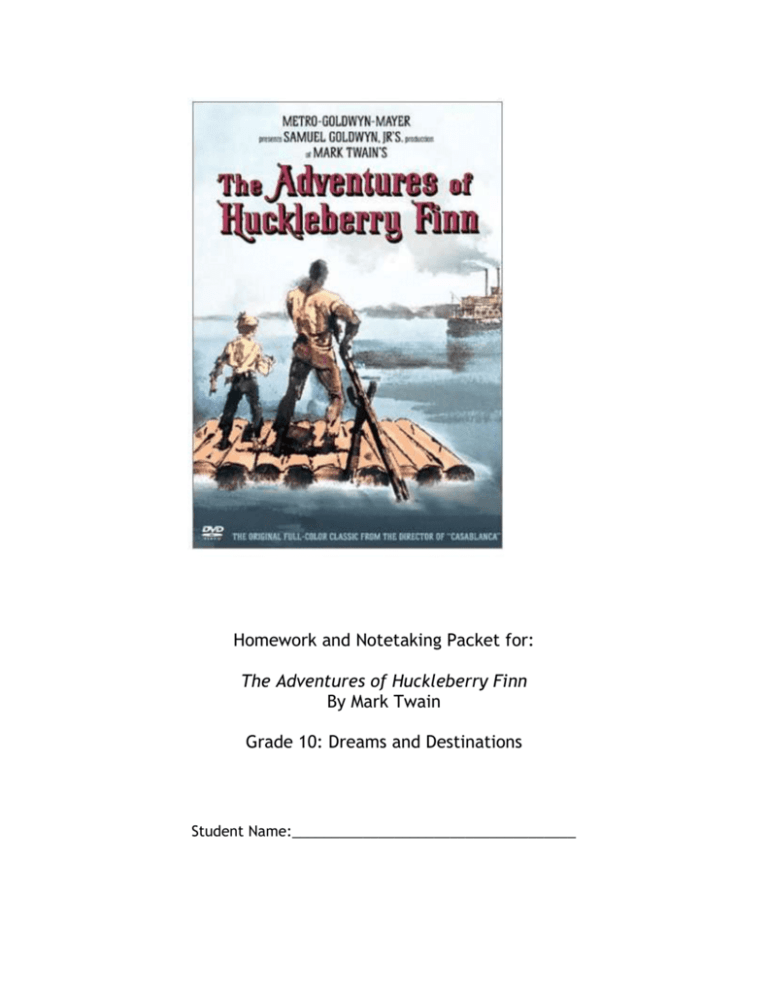
Homework and Notetaking Packet for: The Adventures of Huckleberry Finn By Mark Twain Grade 10: Dreams and Destinations Student Name:____________________________________ Huckleberry Finn By Mark Twain Grade 10: Dreams and Destinations Unit Overview “Persons attempting to find a motive in this narrative will be prosecuted; persons attempting to find a moral in it will be banished; persons attempting to find a plot in it will be shot.” ~Mark Twain on Huckleberry Finn Essential Questions: How does telling the story from Huck’s point-of-view influence the facts being presented? What does this novel reveal about slavery/racism during the time period of the novel? How do satire and irony help the author make his point? Overview: In Huckleberry Finn, Mark Twain tells the story of the friendship between a young boy, Huck Finn and an escaped slave, Jim as they travel the Mississippi River in search of freedom. We will be spending four weeks exploring characters, themes and narrative structure. We will also explore some of the controversies that have surrounded the novel since its publication in 1885, which has caused the book to be banned in many schools. We will examine how Mark Twain uses satire and irony to make a political statement through a fictional text. The unit will conclude with an analytical essay. Assessments: Long Composition style analytical essay Homework Notes and Packet Chapter Quizzes Circle Discussions Homework: For each night of homework, please take notes (include page numbers) that will prepare you to answer essential questions as well as possible essay questions. At times, the assignment will also include a page of the packet. Reading Schedule: Monday Tuesday Wednesday Thursday October 25 Friday October 26 CW: p. 9-18 CW: p. 28-32 HW: p. 19-27 & “Character List” in the packet HW: p. 33-46 November 1 November 2 October 29 October 30 October 31 CW: “Pointof-View Activity & read p. 47-57 Mandarin Trip “Analyzing CW: Relationships” p. 88-98 & Read p. 74- & “Morals” 81 HW: p. 58-73 Due Wednesday HW: 82-87 HW: p. 99-107 CW: Seminar HW: Study for Vocab Quiz November 5 November 6 November 7 November 8 November 9 CW: Vocab List 4 CW:117-128 (handout due at the end of class) CW: p. 138146 & “Satire” from the packet CW: p. 157162 CW: p. 169-175 p. 108-116 & “Open Response” in the packet HW: Finish CW November 12 No School HW: p. 129137 HW: p. 147156 HW: p. 176-183 HW: p. 163168 & “Summarize: Chapters 2123” in packet November 13 November 14 November 15 November 16 CW: p. 184191 & “Summarize: Ch. 24-26” CW: p. 209218 CW: p. 232238 CW: p. 252-258 HW: p. 192208 and “Pros/Cons” in packet HW: p. 259-271 HW: p. 219231 & “Outlining” in the packet (Due Tuesday) HW: p. 239251 & “Before and After” in the packet November 26 November 27 CW: p. 272278 & “Mapping” in the Packet CW: “Pointof-View” in the Packet HW: p. 279290 HW: p. 291307 November 28 November 29 November 30 In-Class Assessment Long Composition The final assessment for the unit will be a long composition in the style of the MCAS. You will be scored according to the same rubric used on the MCAS. Your essay should have: five paragraphs (introduction, conclusion and three body paragraphs) a strong thesis three claims specific evidence from the text correct title (underlined) and author correct character names It does not need to have: quotes page numbers Sample MCAS Prompts (from previous years) WRITING PROMPT #1 In many works of literature, a character must adjust to life in a new environment. From a work of literature you have read in or out of school, select a character who must adjust to life in a new environment. In a well-developed composition, identify the character, describe how the character adjusts to life in a new environment, and explain how the character’s adjustment relates to the work as a whole. WRITING PROMPT #2 Works of literature often feature characters who overcome hardship and misfortune. From a work of literature you have read in or out of school, select a character who overcomes hardship and misfortune. In a well-developed composition, explain how the character overcomes adversity and why this success is important to the work of literature. WRITING PROMPT #3 Works of literature often feature characters with the ability to inspire or lead others. From a work of literature you have read in or out of school, select a character with the ability to inspire or lead others. In a well-developed composition, identify the character, describe how the character inspires or leads others, and explain why this character's ability is significant to the meaning of the work of literature. WRITING PROMPT #4 Often, works of literature include characters that change as a result of a particular event. From a work of literature you have read in or out of school, select a character that has been changed by a particular event. In a well-developed composition, identify the character, describe the event, and explain why the character’s change is important to the work of literature. WRITING PROMPT #5 Heroism can mean different things to different people. Literature is full of characters that can be considered heroic. From a work of literature you have read in or out of school, select a character that, in your opinion, is heroic. In a well-developed composition, identify that character and explain why he or she is heroic. WRITING PROMPT #6: Often in works of literature, a character’s life is affected by a single act or mistake. From a work of literature you have read in or out of school, select a character whose life is affected by a single act or mistake. In a well-developed composition, identify the character, describe how he or she is affected by a single act or mistake, and explain how the character’s experience relates to the work as a whole. WRITING PROMPT #7 Often in works of literature, characters gain wisdom through experience. From a work of literature you have read in or out of school, select a character who gains wisdom through experience. In a well-developed composition, identify the character, describe how the character gains wisdom through experience, and explain how this wisdom relates to the work as a whole. Long Composition Rubric Score Description 60 Rich topic/idea development Careful and/or subtle organization Effective/rich use of language 50 Full topic/idea development Logical organization Strong details Appropriate use of language 40 Moderate topic/idea development and organization Adequate, relevant details Some variety in language 30 Rudimentary topic/idea development and/or organization Basic supporting details Simplistic language 20 Limited or weak topic/idea development, organization, and/or details Limited awareness of audience and/or task 10 Limited topic/idea development, organization, and/or details Little or no awareness of audience and/or task Scoring Guide for Standard English Conventions Select a score point in the table below to view the sample student response Score Description 40 Control of sentence structure, grammar and usage, and mechanics (length and complexity of essay provide opportunity for student to show control of standard English conventions) 30 Errors do not interfere with communication and/or Few errors relative to length of essay or complexity of sentence structure, grammar and usage, and mechanics 20 Errors interfere somewhat with communication and/or Too many errors relative to the length of the essay or complexity of sentence structure, grammar and usage, and mechanics 10 Errors seriously interfere with communication AND Little control of sentence structure, grammar and usage, and mechanics Character List Chapters 1-4 Response (p. 9-27) List Each Character’s Name and anything you know about him/her: Character Traits/Role/Relationship to Other Characters/Related Events Point-of-View Activity: Chapters 5-7 (p. 28-46) Describe the major events of the chapter from Pap’s point-of-view. (~200 words in paragraph form) __________________________________________________________ __________________________________________________________ __________________________________________________________ __________________________________________________________ __________________________________________________________ __________________________________________________________ __________________________________________________________ __________________________________________________________ __________________________________________________________ __________________________________________________________ __________________________________________________________ __________________________________________________________ __________________________________________________________ __________________________________________________________ __________________________________________________________ __________________________________________________________ __________________________________________________________ __________________________________________________________ __________________________________________________________ __________________________________________________________ __________________________________________________________ __________________________________________________________ __________________________________________________________ __________________________________________________________ __________________________________________________________ __________________________________________________________ __________________________________________________________ __________________________________________________________ __________________________________________________________ __________________________________________________________ __________________________________________________________ __________________________________________________________ __________________________________________________________ __________________________________________________________ __________________________________________________________ Analyzing Relationships: Chapters 8-11 (p. 47-73) Choose ONE: A. Describe Huck’s relationship to Jim. Use evidence to support your viewpoint. B. Create three panels of scenes that show Huck’s relationship to Jim. __________________________________________________________ __________________________________________________________ __________________________________________________________ __________________________________________________________ __________________________________________________________ __________________________________________________________ __________________________________________________________ __________________________________________________________ __________________________________________________________ __________________________________________________________ __________________________________________________________ __________________________________________________________ __________________________________________________________ __________________________________________________________ __________________________________________________________ __________________________________________________________ __________________________________________________________ __________________________________________________________ __________________________________________________________ __________________________________________________________ __________________________________________________________ __________________________________________________________ __________________________________________________________ __________________________________________________________ __________________________________________________________ __________________________________________________________ __________________________________________________________ __________________________________________________________ __________________________________________________________ __________________________________________________________ Choice B: Graphic Art Morals: Chapter 12-15 (p. 74-98) List some instances where Jim and Huck have to decide the “right” thing to do. Describe how they understand their dilemma. What is the dilemma? 1. 2. 3. 4. How do they react? Open Response: Chapter 16 & 17 (99-116) Question: Huck’s position as a child gives him a special point-of-view. How might these chapters be different if Huck were an adult? (200-300 words) __________________________________________________________ __________________________________________________________ __________________________________________________________ __________________________________________________________ __________________________________________________________ __________________________________________________________ __________________________________________________________ __________________________________________________________ __________________________________________________________ __________________________________________________________ __________________________________________________________ __________________________________________________________ __________________________________________________________ __________________________________________________________ __________________________________________________________ __________________________________________________________ __________________________________________________________ __________________________________________________________ __________________________________________________________ __________________________________________________________ __________________________________________________________ __________________________________________________________ __________________________________________________________ __________________________________________________________ __________________________________________________________ __________________________________________________________ __________________________________________________________ __________________________________________________________ __________________________________________________________ __________________________________________________________ Satire: Chapter 18-20 (117-146) According to Study Guide, “Satire…tries to open people’s eyes to the need for change by exposing the flaws of a person or society.” Instructions: List characters and their flaws. **Challenge Option: What do these flaws reveal about society?** Characters Flaws What do these flaws reveal about society Summarize: Chapters 21-23 (p. 147-168) Summarize what the king and duke do in these chapters. How do Huck and Jim react? __________________________________________________________ __________________________________________________________ __________________________________________________________ __________________________________________________________ __________________________________________________________ __________________________________________________________ __________________________________________________________ __________________________________________________________ __________________________________________________________ __________________________________________________________ __________________________________________________________ __________________________________________________________ __________________________________________________________ __________________________________________________________ __________________________________________________________ __________________________________________________________ __________________________________________________________ __________________________________________________________ __________________________________________________________ __________________________________________________________ __________________________________________________________ __________________________________________________________ __________________________________________________________ __________________________________________________________ __________________________________________________________ __________________________________________________________ __________________________________________________________ __________________________________________________________ __________________________________________________________ __________________________________________________________ Summarize: Chapter 24-26 (p. 169-191) Summarize chapters 24-26 from the perspective of the king or duke. (~100-200) __________________________________________________________ __________________________________________________________ __________________________________________________________ __________________________________________________________ __________________________________________________________ __________________________________________________________ __________________________________________________________ __________________________________________________________ __________________________________________________________ __________________________________________________________ __________________________________________________________ __________________________________________________________ __________________________________________________________ __________________________________________________________ __________________________________________________________ __________________________________________________________ __________________________________________________________ __________________________________________________________ __________________________________________________________ __________________________________________________________ __________________________________________________________ __________________________________________________________ __________________________________________________________ __________________________________________________________ __________________________________________________________ __________________________________________________________ __________________________________________________________ __________________________________________________________ __________________________________________________________ __________________________________________________________ __________________________________________________________ __________________________________________________________ __________________________________________________________ ________________________________________________________ Pros/Cons: Chapters 27 & 28 (p. 192-208) What has made Huck decide to turn against the duke and king? Make a list of the pros and cons he might be considering. Reasons to continue the friendship with the King and Duke Reasons to turn against the King and Duke Outlining: Chapters 29-31 (p. 209- 231) What’s important? Instructions: Outline the 10 most important events in this section. 1. 2. 3. 4. 5. 6. 7. 8. 9. 10. Before and After: Chapters 32-34 (p. 232-251) How does Huck and Jim’s relationship change once they both arrive at Aunt Sally’s house? How did Huck and Jim act towards each other when they’re on the river? How do Huck and Jim act towards each other once they arrive at Aunt Sally’s? Mapping: Chapter 35-38 (p. 252-278) Instructions: Map or list Tom’s strategies for Jim’s rescue. Point-of-View:Chapter 39-40 (p. 279-290) Instructions: Write a conversation between Aunt Sally and Uncle Silas. __________________________________________________________ __________________________________________________________ __________________________________________________________ __________________________________________________________ __________________________________________________________ __________________________________________________________ __________________________________________________________ __________________________________________________________ __________________________________________________________ __________________________________________________________ __________________________________________________________ __________________________________________________________ __________________________________________________________ __________________________________________________________ __________________________________________________________ __________________________________________________________ __________________________________________________________ __________________________________________________________ __________________________________________________________ __________________________________________________________ __________________________________________________________ __________________________________________________________ __________________________________________________________ __________________________________________________________ __________________________________________________________ __________________________________________________________ __________________________________________________________ __________________________________________________________ __________________________________________________________ __________________________________________________________ __________________________________________________________ __________________________________________________________ __________________________________________________________ __________________________________________________________ __________________________________________________________ __________________________________________________________ Ending: Chapters 41-End of Book (p. 291-307) Instructions: Write your reaction to the ending. __________________________________________________________ __________________________________________________________ __________________________________________________________ __________________________________________________________ __________________________________________________________ __________________________________________________________ __________________________________________________________ __________________________________________________________ __________________________________________________________ __________________________________________________________ __________________________________________________________ __________________________________________________________ __________________________________________________________ __________________________________________________________ __________________________________________________________ __________________________________________________________ __________________________________________________________ __________________________________________________________ __________________________________________________________ __________________________________________________________ __________________________________________________________ __________________________________________________________ __________________________________________________________ __________________________________________________________ __________________________________________________________ __________________________________________________________ __________________________________________________________ __________________________________________________________ __________________________________________________________ __________________________________________________________ __________________________________________________________ __________________________________________________________ __________________________________________________________ __________________________________________________________ __________________________________________________________ __________________________________________________________




